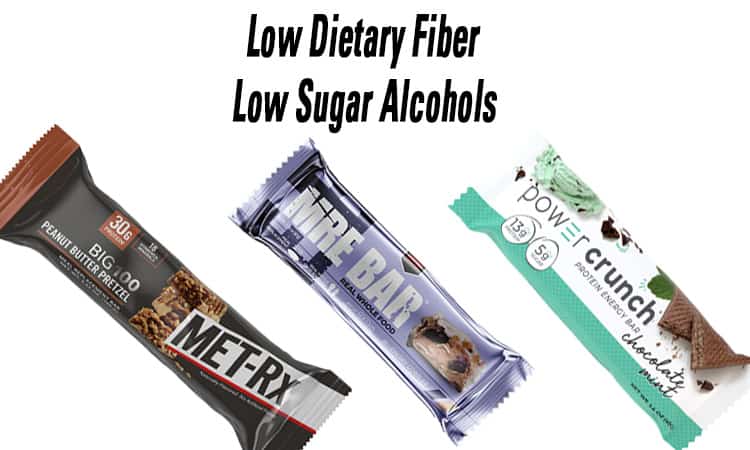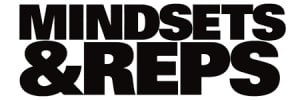
Protein bar manufacturing has improved tremendously in the past decade. Companies can now formulate and flavor protein bars and other food products that rival desserts while maintaining a decent macronutrient profile.
In many cases, however, the nutrition aspect means that there is usually some sort of tradeoff. If something seems too good to be true, it likely is. Supplement companies have to formulate protein bars in a way where the bar is palatable, the protein is high, and the calories are fairly low.
One tactic often used is the introduction of sugar alcohols into the product. Sugar alcohols are used in place of sugar to sweeten a product, since they have fewer calories per gram.
Gram for gram they taste sweeter than sugar, similar to the way artificial sweeteners (which are different from sugar alcohols) are also sweeter than sugar. Therefore you need less of them to flavor a product.
You’ll often see sugar alcohols like xylitol or erythritol in things like sugar free gum, but it’s usually only a gram or two. They are found in many protein bars, and are particularly prevalent in protein ice cream.
While sugar alcohols are not inherently harmful in any way, eating them in significant amount can cause gastrointestinal distress. Some people are especially sensitive to sugar alcohols, and experience stomach discomfort even in small amounts.
Luckily they are easy to identify. Since sugar alcohols are not technically a carbohydrate, they will be listed separately on a nutrition facts panel on the back of a protein bar or box that they come in.
Another ingredient that is a culprit for stomach pain found in many protein bars is dietary fiber. This is not so much dietary fiber itself, as it is crucial for overall health and wellbeing, but in the amount.
Consider a healthy, whole food that is a good source of fiber like oatmeal. One half cup of uncooked oatmeal contains 4 grams of fiber.
By comparison, the average Quest bar has 14 grams of fiber. The type of fiber used is soluble corn fiber. Similar to sugar alcohols, this fiber is used to help sweeten the product. However, due to the way it is structured and the way it digests in the body, it is technically a fiber.
Another reason for the high fiber content is because of the net carbs phenomenon. You’ll likely see the words “net carbs” plastered on any product that contains high amounts of fiber or sugar alcohols.
Net carbs are total carbohydrates minus dietary fiber and sugar alcohols. Net carbs are touted on labels because they are supposed to represent the blood sugar response from eating that particular food.
However, consumers are often confused by the concept of net carbs and assume they are eating fewer calories than they really are. While dietary fiber and sugar alcohols contain less calories than a standard carbohydrate, they still contain calories nonetheless.
Bars that are high in both sugar alcohols and/or dietary fiber that should be avoided for anyone with a sensitive stomach include Quest Bars, ONE Protein Bars, No Cow Bars, Detour, and Robert Irvine.
While high amounts of dietary fiber and sugar alcohols (sometimes both) are found in most protein bars, there are still exceptions. Assuming either one is the cause of potential stomach discomfort; you can look to these protein bar options for relief.
This is a running list of easily digestible protein bar options in no particular order. Each has their own advantages and disadvantages in terms of quality, price, and nutrition value.
These are legitimate protein bars with relation to the protein content in them. Some bars are touted as protein bars and contain 6-8 grams of protein per serving. That’s not a protein bar. Anything listed below will be in the 12-30 gram range.
1. Power Crunch Bars
Power crunch bars have a unique consistency compared to other, dense protein bars. It’s basically a large wafer covered in whatever flavor you choose.
The bar is low in carbs (actual carbs, not net carbs) but has a high fat content. It’s borderline keto friendly depending on the context of the rest of the diet, but would definitely fit a less strict low carb protocol.
Each bar contains 13 grams of protein, which is decent but still on the lower end compared to other protein bars. It has no sugar alcohols and negligible amounts of fiber. Comparatively the cost per bar is much less than their competitors.
2. Clif Builders Bars
Containing zero sugar alcohols, Clif Builders bars are a solid option for anyone with a sensitive stomach. Each bar contains only 3 grams of fiber. These are not to be confused with the standard Clif bars, which have must less protein per serving.
Clif Builders bars are more dense and filling than power crunch bars. The only tradeoff is that the protein comes from soy rather than whey. Soy is still a decent protein source in terms of quality, but will rank lower than whey.
It’s hard to beat the price of these bars, a box of 12 will run only about $1.50 per bar.
3. MetRx Big 100 Colossal Protein Bars
MetRx packs the highest protein and calorie content of any bar on the list. On average, a bar contains about 400 calories and 30 grams of protein. You’d be hard pressed to find any protein bar in any category that is higher than that.
It’s important to note that different flavors contain different amounts of sugar alcohols, so be sure to check the label as they all vary.
The reason it makes the list is because two of the best flavors, Apple Pie and Peanut Butter Pretzel, contain little to no sugar alcohols. Apple Pie contains 4 grams of sugar alcohols with just 1 gram of fiber. Peanut Butter Pretzel contains no sugar alcohols and 3 grams of fiber.
MetRx bars are the best option for anyone looking to build muscle and are consuming a high calorie diet. While taste is subjective, these are personally my favorite of the bunch. Even when dieting, I’ll find a way to fit these into my daily macros.
The bars also contain a vast array of vitamins and minerals. This, coupled with the high calorie content, is why they are fit to serve as a true meal replacement.
4. Redcon1 MRE Bars
Redcon1 is one of the fastest growing supplement brands in the industry. They have a unique product line and place an emphasis on using real food sources and ingredients as part of their formulations.
The MRE bars are considered one of the best tasting bars on the market. They contain zero grams of sugar alcohols and 3 grams of fiber per serving. The protein sources come from whole foods like chicken, brown rice, and salmon as opposed to whey, soy, or casein.
One consistency among Redcon1 products is the variety of flavor options. The protein bars come in over a dozen flavors, similar to their other protein products. The flavors are also unique, with options such as carrot cake, blueberry cobbler, and banana nut bread.
Recent Posts
All protein shakes are not created equal. Different protein shakes are more optimal in different situations. Your fitness goals are not the only thing that determines which protein powder to...
Many people have jobs where a microwave is simply not an option. It may be a blue collar job like construction work where the job site is always at a different location, or a job that requires a...
